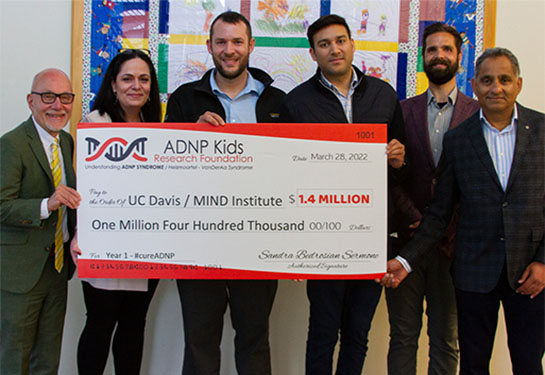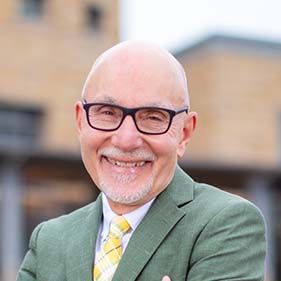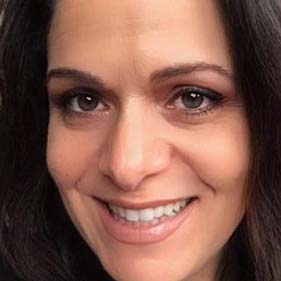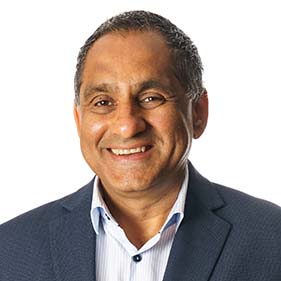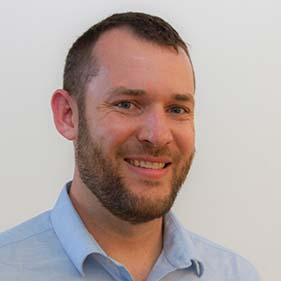$4 million research program seeks therapy for rare genetic condition ADNP syndrome
UC Davis MIND Institute investigates gene therapies through partnership with ADNP Kids Research Foundation, Simba Global
Researchers at the UC Davis MIND Institute are launching a $4 million program to find transformative therapies for ADNP syndrome. The rare genetic condition causes developmental delays and can affect the brain, heart, gastrointestinal system and more.
The ambitious three-year project is funded through a unique partnership between the ADNP Kids Research Foundation and international textile company Simba Global.
The research will involve the MIND Institute’s interventional genetics team, which includes internationally recognized experts in mouse models for therapeutic development and in gene therapy, including the use of the gene editing tool CRISPR.
“This is a groundbreaking interdisciplinary project. We are grateful to the ADNP Kids Research Foundation and Simba Global for investing in this research that we hope will have a meaningful impact on the lives of individuals with ADNP syndrome,” said MIND Institute Director Leonard Abbeduto.
There’s great synergy in the fact that this is being funded by families, just as the MIND Institute was founded by families with the same goal: improving life for children.”—Leonard Abbeduto, director, MIND Institute
What is ADNP syndrome?
ADNP syndrome is a complex neurodevelopmental condition caused by a mutation or change in the ADNP (Activity Dependent Neuroprotective Protein) gene, which affects brain development, connectivity and function. The syndrome, first identified in 2014, affects males and females in equal numbers.
Its core features include delays in development and growth, intellectual disability and autism or autistic characteristics. It is one of the top single-gene causes of autism.
The impacts of ADNP syndrome can be profound and may include delayed speech, low muscle tone and sensory processing challenges. The brain, heart and musculoskeletal system are often affected. ADNP syndrome is also associated with distinctive facial features, including a prominent forehead, eyes that are farther apart and droopy eyelids.
ADNP syndrome is estimated to affect 1 in 20,000 people in the U.S. and Europe. The incidence is likely higher due to children who’ve gone undiagnosed.

It has been my goal since I started the foundation to find treatments for all individuals with ADNP syndrome as fast as possible, and this collaborative project is a big step forward, one we could never had made without the generosity of the Somaia family, to whom we are so grateful.”—Sandra Bedrosian Sermone, founder, ADNP Kids Research Foundation
Two families, one goal
According to the ADNP Kids Research Foundation, about 400 children in the world have been diagnosed with the syndrome. The very first child in the U.S. to receive the diagnosis was Tony Sermone.
“He lived in and out of the hospital for the first four years of his life,” explained Sandra Bedrosian Sermone, Tony’s mother and the founder of the ADNP Kids Research Foundation, which is based in the state of Washington.
Tony, who was born in 2008, had two open heart surgeries, significant developmental delays, seizures and strokes. He was identified as autistic and had trouble eating, swallowing, walking and talking. He was diagnosed with ADNP syndrome at age 6.
“A rare disease parent is the most motivated machine in medicine,” said Bedrosian Sermone, who began researching the syndrome and formed the foundation to connect with other parents and fund studies. She has since published articles in scientific journals, discovered the syndrome’s first biomarker in baby teeth and is running a drug trial for ADNP.
“It has been my goal since I started the foundation to find treatments for all individuals with ADNP syndrome as fast as possible, and this collaborative project is a big step forward, one we could never had made without the generosity of the Somaia family, to whom we are so grateful,” she said.
Through the foundation, Bedrosian Sermone connected with the Somaia family in Melbourne, Australia, where 2-year-old Tye was recently diagnosed with ADNP syndrome.
“Sandra is an absolute crusader and supermom,” said Drish Ashar, an executive with Simba Global and Tye’s cousin. “As a family, we wanted to see what we could do when we put more resources behind her and try to bring the entire community together.”
That’s how the partnership between the foundation, the Somaia family, who founded Simba Global, and UC Davis began.
“As much as this is about Tye and Sandra’s son Tony, we also want to be able to help all of the ADNP families and to have an impact on other rare diseases because they’re often the least funded in terms of medical research,” said Hiten Somaia, Simba Global co-founder.
His sister, Lina, also a Simba Global co-founder, goes even farther:
“I always say that if we can think of our own children as our biological children, but the rest of the world’s children as our karmic children, that would be something magical,” she said.
We…want to be able to help all of the ADNP families and to have an impact on other rare diseases because they’re often the least funded in terms of medical research.” —Hiten Somaia, co-founder, Simba Global
The team science fast track
The interventional genetics team includes three MIND Institute faculty members who are leading experts in their disciplines.
- Kyle Fink, assistant professor in the Department of Neurology, the UC Davis Stem Cell Program and the Gene Therapy Center.
- Jill Silverman, professor in the Department of Psychiatry and Behavioral Sciences and a well-known expert in the use of rodent models for therapeutic development.
- David Segal, member of the UC Davis Genome Center and professor in the Departments of Biochemistry and Molecular Medicine and Pharmacology.
The group excels in what’s called “bench to bedside” research — translating results from the lab directly into therapies for patients.
Parallel projects
The program will include two major phases. First, the team will use stem cell technology to create a human ADNP model in Petri dishes. They’ll also characterize mice with ADNP mutations. That will involve looking at cognitive abilities, sleep changes, gait abnormalities and more. Finally, the team will do a deep molecular characterization of the cells in the mice.
“That information will be useful to anyone who wants to study ADNP,” Fink said. “We’ll be able to say, ‘in the mice at this age, there’s this big effect, so if you have a drug, you can test it in this mouse at this age using these tasks.’”
The second phase, the one that “everyone gets the most excited about,” noted Fink, is evaluating therapies for ADNP. To fast-track progress, the team will work simultaneously on three different therapies.
“We think of it as shots on goal,” Fink said. “Time is of the essence with these conditions.”
They’ll be evaluating a traditional gene therapy delivered using a virus - one that’s been used in clinical trials and approved by the FDA for spinal-muscular atrophy. The team will also assess an ASO (antisense oligonucleotide) that modulates gene expression by binding to mRNA. The third is being developed using the gene-editing tool CRISPR.
“When we use a form of deactivated CRISPR, we tell the cell how to regulate specific genes,” Fink explained.
The therapeutics get tested in mice, then in the cells, but rather than sequentially, they’ll be characterizing the mice and cells on parallel tracks. That will enable them to move much more quickly.
“We want to ensure we’re putting the resources into therapeutics that we really think will make a significant impact in more than just one domain of these kids’ lives. I think these three approaches really give us a great chance to find something that can move forward in a meaningful way,” Fink said.
We want to ensure we’re putting the resources into therapeutics that we really think will make a significant impact in more than just one domain of these kids’ lives. I think these three approaches really give us a great chance to find something that can move forward in a meaningful way.” —Kyle Fink, Stem Cell Program, assistant professor of neurology
A history of success
The team has had previous success with their work on another rare genetic condition, Angelman syndrome. Their labs helped create and characterize the first rat model of the syndrome. The Segal lab also developed a protein therapeutic that could increase the level of the affected gene in mouse models of Angelman syndrome – a major discovery.
The group is also working on a similar project to develop molecular therapies for the genetic condition SYNGAP1.
Additionally, Fink and Segal were part of a study that showed it was possible to reactivate a gene from the inactive X chromosome using epigenetic editing as a potential treatment for CDKL5 deficiency disorder, another rare neurodevelopmental condition.
“Jill, Dave and Kyle have a proven track record and are doing extraordinary work,” Abbeduto said. “This project is a perfect fit for them and the MIND Institute. There’s great synergy in the fact that this is being funded by families, just as the MIND Institute was founded by families with the same goal: improving life for children.”
Fink, Silverman and Segal are already recruiting new researchers in their labs that will be devoted to this project.
“We will train the next world leaders in ADNP research,” Fink said.
As the interventional genetics team builds on past success and fine-tunes its infrastructure for evaluating therapeutics, the researchers expect the work to reach far beyond ADNP.
That’s important to Bedrosian Sermone. “I’m a true believer that these rare diseases can be worked on at the same time. When you find something for one of us, you often find something for all of us.”
Tye’s mother, Zuzana Horakova, is also thrilled about the possible impact.
“I’m very hopeful and very positive about this project. If, in the future, we can open up the possibilities for all sorts of other rare diseases, too, that’s mind-blowing,” she said.
The UC Davis MIND Institute in Sacramento, Calif. was founded in 1998 as a unique interdisciplinary research center where families, community leaders, researchers, clinicians and volunteers work together toward a common goal: researching causes, treatments and potential prevention of challenges associated with neurodevelopmental disabilities. The institute has major research efforts in autism, fragile X syndrome, chromosome 22q11.2 deletion syndrome, attention-deficit/hyperactivity disorder (ADHD) and Down syndrome. More information about the institute and its Distinguished Lecturer Series, including previous presentations in this series, is available on the Web at mindinstitute.ucdavis.edu.

